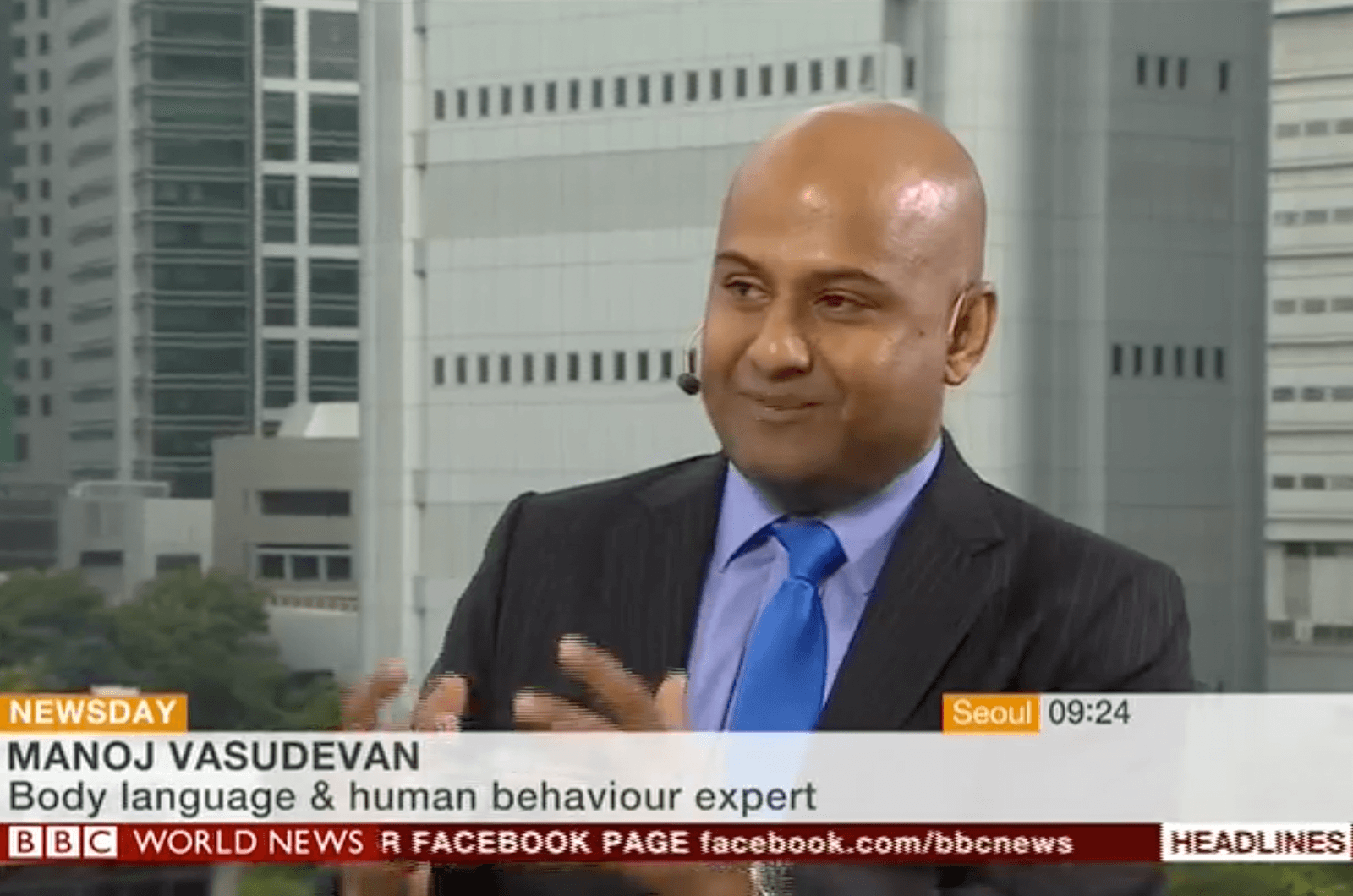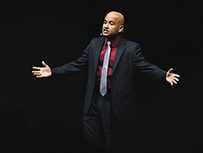 Manoj Vasudevan, 2017 Toastmasters World Champion of Public Speaking, analyzed the non-verbal communication dynamics between Donald Trump and Kim Jong Un at their June 12, 2018 meeting.
Manoj Vasudevan, 2017 Toastmasters World Champion of Public Speaking, analyzed the non-verbal communication dynamics between Donald Trump and Kim Jong Un at their June 12, 2018 meeting.How long do you spend preparing for your presentations? One day? Two days? Three months? I believe the right answer is a lifetime. Sometimes, when opportunity knocks, you have no time to research, prepare or practice—you need to count on your life experience.
On June 11, 2018, I was contacted about a unique opportunity. A BBC World News producer from the U.K. emailed, asking me to appear on a live broadcast the next day—a day that would witness a historic event: the first meeting between United States President Donald Trump and North Korean leader Kim Jong Un.
Honored to be asked, I gave credit to my title of 2017 Toastmasters World Champion of Public Speaking and gave it my best. The BBC producer asked me to discuss on-air what kind of communication dynamics to expect in the meeting, such as the non-verbal signals expressed by the two leaders with their body language.
Like many others, I had been keenly interested in this geopolitical development for a long time, but I didn’t know what insight I could offer with the event scheduled to take place in less than 14 hours. Thankfully, over the years I have learned to stay prepared and seize opportunities when they arise.
I viewed this invitation as my chance to play a small part on a historic day. I have seen many experts panic when opportunity knocks. Consequently, I have learned to say yes first and then figure out how to deliver.
In a follow-up phone call, I asked the BBC producer, “What exactly do you want me to do?” She said, “President Trump made a comment to reporters that he can judge Mr. Kim Jong Un within one minute of meeting him. We want you to comment on that.”
“When it comes to media, it is important to know what to say, but it is more important to know what not to say.”
I researched the two global leaders and reviewed video footage of their media appearances, various interviews and meetings. While I thought my understanding of the task was clear, something unexpected was about to happen.
On the day of the meeting between the two leaders, I woke up early in my Singapore home, and by 6 a.m. I was on a hotel rooftop overlooking the Singapore River. This was the location from which the historic meeting would be broadcast live around the world. The place was buzzing with activity. I told the BBC World News anchor, “I have already reviewed the video and I am ready to comment on it.” To my surprise, she said, “What video?” I told her about the video the producer asked me to review. She replied nonchalantly, “Oh, don’t worry about that, we won’t be asking you about that. We will ask you something else.”
I felt like a student who prepared for a physics examination and then faced the prospect of answering questions on biology and history. In situations like this, it is important to trust your instincts, lean on your experience and use common sense. When somebody has assigned you a task, they trust you can handle it and count on you to do whatever it takes to make it happen. You must trust yourself and believe you will have the answers.
Lights on, cameras rolling. I was introduced as Manoj Vasudevan, human-behavior and body-language expert. The interviewer asked, “What should we be looking out for in the upcoming meeting between President Trump and Kim Jong Un? And what did you make out from the first meeting between Kim Jong Un and the Singapore Prime Minister?” The monitor in front of me showed taped footage of Kim Jong Un meeting the Prime Minister and other Singapore leaders the day before. I was seeing it for the first time. (You can never be fully prepared.)
But I trusted the skills and instincts I had developed over the years as a Toastmaster and public speaker. I launched into my observations and analysis. In regard to the question about Trump and Kim Jong Un, I discussed the former as a seasoned speaker who has extensive experience with media and the latter as a leader with almost no experience on the world stage. Then, when visuals of the first face-to-face encounter between Trump and the North Korean leader aired live, I shared my thoughts about their interaction. I spoke about the cultural expectations in North America and the cultural norms in Asia. Later, I commented on Trump’s decision to wear a red tie, his handshakes, his eye contact and other behaviors I noticed.
On the broadcast with me was Robert E. Kelly, an American political analyst and expert on North Korea at Pusan National University in South Korea. He leaned over to me and said, “You are absolutely spot-on. We should catch up.” That was a great validation at just the right time.
“I have learned to say yes first and then figure out how to deliver.”
I thought I was done, but the producers asked me to stay. I was called upon to appear a few more times that day as events unfolded. Each time, I strove to avoid commenting on the political aspects of the meeting and stuck to my expertise on human behavior. When it comes to the media, it is important to know what to say, but it is more important to know what not to say. The following day I received an email from BBC producers with rave reviews about my observations and comments. I was flattered by that unexpected praise.
In summary, I would like to share three lessons in particular, drawn from having made this appearance on a global news network at very short notice:
- Stay updated with what’s going on in the world—you never know when opportunity will knock.
- Be willing to seize opportunities that arise, because you can’t grow if you don’t step outside your comfort zone.
- The world needs to hear your views, because your views matter!
Manoj Vasudevan, ACS, CL is an expert on next-level leadership, CEO of Thought Expressions and author of Mastering Leadership the Mousetrap Way. He is the 2017 Toastmasters World Champion of Public Speaking.



 Previous
Previous
 Previous Article
Previous Article

